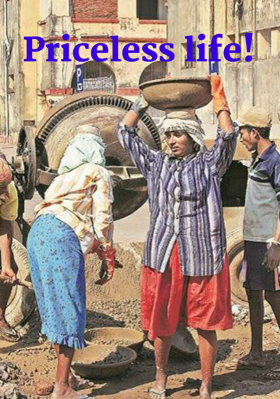Home - The Pain In Survival
Home - The Pain In Survival


As I wander through the ruins that I once called home I can’t help but feel the apparent despair and hopelessness. Everything that I once called home is lost. The home has lost its warmth.
For me the mere mention of home brought to my mind the images of me entering the home. It’s an old house, really old something like 150 years old. Many heritage enthusiastic organisations have declared it as a heritage site and offered to renovate the parts of it.
Of course my parents declined the offer, their argument: “It’s our home and if we feel need to renovate something we will renovate it on our own.” I always liked this pride of theirs, it made me think of them as the strong people who will never bow whatever be the circumstances.
I mean these are the people who survived the ethnic cleansing and target killings of the 1990s. They survived the hostile environment that followed and yet brought up me without making me realize what they had gone through.
As I made my way past the giant gates, I look around the elegant but deserted buildings that were all around my home. These were all inhabited by people before they left to survive the persecution in the terror infested decade of 1990s.
These deserted houses acted like the perfect playing spots in my childhood. In my adolescent years they were used as hiding spots for scaring my friends who would visit me for the first time. Over the last few years I visited these houses once in a while, remembering the old times spent in these very places.
Next, I reach the doors of the house I call my home. I walk through the dimly lit corridors which lead to a veranda facing the garden. The garden is a beautiful collection of flowering plants, a square patch of grass with flower beds all around it and another patch of land beyond that what might be called a kitchen garden.
There is coriander, mint, strawberry plants, a tomato shrub, roses of four different colours and a lot of other flowers and vegetables. It’s icy cold winter and freezing winds are blowing against my face. I take off my shoes and enter the room. There I see my mother putting wood in the fire place (Bhukhari). The room feels warm and welcoming.
As I take off my jacket I look around. The pictures of Hindu Gods and Goddesses adore the walls. My mother always insisted on a very strong presence of God and therefore every deity that she prayed to found a place on the walls. Lying here and there in the room are the jackets and various other pieces of clothing that my younger brother has thrown around and does not seem to care to pick up.
My thoughts are broken with a soft ‘thud’ of the door banging against the woolen carpets that cover every inch of the house. There is my mom, standing with a cup of warm tea and complaining about how Vinny never cares about the mess he creates and how bad it looks in case some guests arrive. I listen to her intently mildly smiling because this is what is home, or what used to be my home. Now it’s just a memory that remains in my head waiting to be forgotten.
It all changed this time. This year when I returned home for my winter vacations the home was not what it used to be. It was a building in ruins in which some people were living or rather managing to live.
As I walked past the home towards the gate I realized the outer boundary walls have fallen and now have been substituted by makeshift walls made up of tin sheets stuck together. I enter through the gate into the premises. I look to my left and I see that the deserted houses have fallen down and have been reduced to mere rubble and debris.
I quickly walk past these structures as I feel a chill go down my spine. I’m feeling cold and after a very long time today I am feeling scared. I enter the home and today the dimly lit corridor is totally dark. The walls of the corridor have been scrapped off totally leaving huge patches of exposed brickwork as islands of devastation among the rest of the walls which have retained their original blue colour but still having being tarnished by the muddy waters of the flood that has as a part of its cruel joke, left marks of rising flood waters on every wall in every room reminding of its omnipotent destruction.
I turn left, taking a small detour, to visit my parent’s room, which also used to double up as my father’s study, housing a significant portion of his book collection. I had an inkling of what I was to see but some part of me refused to believe that such a timeless collection could just be destroyed in the matter of a few minutes. (It had books ranging across the millennia, with authors from both sides of the cold war and topics as diverse as Chinese and Soviet folk literature placed next to mammoth texts of Biology and Botany placed besides Upanishads and Holy Bible).
Fighting all these thoughts I make my way into the room through a door which under normal circumstances would have been bolted at all costs on account of privacy but today it no longer mattered. The giant book rack embedded into the walls were devoid of its ornaments. With its white paint stained from the inside, it presented the dismayed look of a widow left behind and forgotten as a utility that had lost its significance and would now lay in a dark room somewhere hidden from the daily gaze lest it spreads its sadness to others.
Destruction is obvious in the fight of survival but some wounds are just unbearable to live with. Shocked in some unique way which I still cannot describe (I was happy that my parents were safe and had their house to live in, as opposed to thousands who lost that but now it felt like a pain that I had not confronted earlier.) They saved their lives but the flood swept with it a part of their lives.
The elaborate pictures of deities that used to adore the walls were still there but the rotting waters just like a witch’s cauldron was a mixture of deadly acids and whatnot had destroyed them. It had failed to unseat the images of the deities but had managed to wreck the walls, making them inflate and smell like the evil potion that the flood water was.
The living room was devoid of life with just hints and outlines of what it had been. Window panes had been smashed, the windows themselves had been inflated by nature’s waterboarding so badly that they longer fit their frame. It was not just people whose soul had been torn apart, the houses had their fair share of scars as well.
I step into the garden to get a more holistic view of the house. Damaged at the base, it still retained its glory in places untouched by the monster. It stood alone among the ruins of the deserted houses that used to stand by it like a group of careless boys unhindered by the slaps of time.
But today it looked like an old man with scars all over its body, who lost his friends to the same tragedies of life that they would laugh at dismissively. It had won the battle of survival, but perhaps the war of life was still to be won.
Soon mother noticed me walking in the garden with my bags on my shoulders and came out to greet me. She accompanied me to the makeshift bedroom that they had been using this winter. I walk through the long corridor and a veranda to a room we used seldom. It was more of a store room owing to how spacious it was.
I take off my shoes and remove the curtains that have been set up to restrict cold winter air outside. That’s strange. It never used to be the case earlier, home used to be warm enough to negate the effects of the winters just in a few seconds. Nevertheless, I pull the woolen curtains aside and enter.
A sense of dismay runs all over me. Everything is disorganized, or to put it simply, everything is piled up. The room is quite cold and presents an unwelcoming look. Carpets have been rolled up beside the cupboard that seems to burst with belongings that would ideally have been distributed in several rooms. The furniture is non-existent and everything seems to be put on one-another just to make space for everything.
Souvenirs that survived are now gathering dust in a corner, probably thanking their stars that they did not meet the fate of the books. These family heirlooms that would otherwise be spread all across the home with each and every piece marking its territory and distinguishing the history of its owner from among the three generations that would once live there as one big family of uncles and aunts and parents and siblings, were now huddled together. Three generations of a family had been restricted to one tiny shelf now. I guess the history can wait for it rejoices in being told from the depths of misery.
I try settling down on the mattresses that are lying in the corner of a room in absence of the beds that were washed in the floods, but somehow this does not feel real. The comfort and the warmth that the mere thought of home would bring is lacking in the very confines of the home. There is no Bhukhari. Winters in Kashmir are incomplete without Bhukhari & Kangri, and both of them are missing. This winter may well be the coldest one ever.





















































